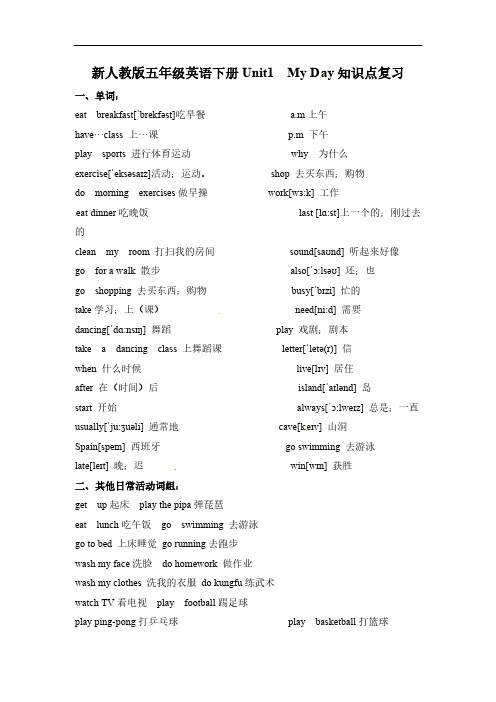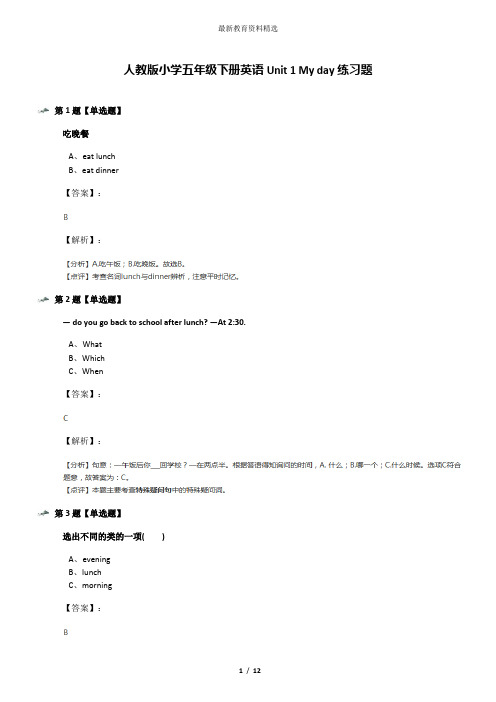人教PEP版英语五年级下册Unit 1《My Day》单词、句子、语法习题
- 格式:docx
- 大小:38.85 KB
- 文档页数:16

PEP英语五年级下册Unit 1 知识梳理【单元语音归纳】一、单词:eat breakfast[ˈbrekfəst]吃早餐 a.m上午have···class 上···课p.m 下午play sports 进行体育运动why 为什么exercise[ˈeksəsaɪz]活动;运动。
shop 去买东西;购物do morning exercises做早操work[wɜ:k] 工作eat dinner吃晚饭last [lɑ:st]上一个的;刚过去的clean my room 打扫我的房间sound[saʊnd] 听起来好像go for a walk 散步also[ˈɔ:lsəʊ] 还;也go shopping 去买东西;购物busy[ˈbɪzi] 忙的take学习;上(课)need[ni:d] 需要dancing[ˈdɑ:nsɪŋ] 舞蹈play 戏剧;剧本take a dancing class 上舞蹈课letter[ˈletə(r)] 信when 什么时候live[lɪv] 居住after 在(时间)后island[ˈaɪlənd] 岛start 开始always[ˈɔ:lweɪz] 总是;一直usually[ˈju:ʒuəli] 通常地cave[keɪv] 山洞Spain[speɪn] 西班牙go swimming 去游泳late[leɪt] 晚;迟win[wɪn] 获胜二、词语1. eat breakfast 吃早饭2. have…class 上……课3. play sports 进行体育活动4. exercise活动;运动5. do morning exercises 做早操6. eat dinner 吃晚饭7. clean my room 打扫我的房间8. go for a walk散步9. go shopping 去买东西;购物10. take 学习;上(课)11. dancing 跳舞;舞蹈12. take a dancing class 上舞蹈课13. go swimming去游泳【重点句型再现】1. 询问对方什么时间做某事的句型及答语—When do you finish class in the morning? 你们上午的课几点结束?—We finish class at 1 o’clock. 我们一点钟结束上午的课。

新人教版五年级英语下册Unit1 My Day知识点复习一、单词:eat breakfast[ˈbrekfəst]吃早餐 a.m上午have···class 上···课p.m 下午play sports 进行体育运动why 为什么exercise[ˈeksəsaɪz]活动;运动。
shop 去买东西;购物do morning exercises做早操work[wɜ:k]工作eat dinner吃晚饭last [lɑ:st]上一个的;刚过去的clean my room 打扫我的房间sound[saʊnd]听起来好像go for a walk 散步also[ˈɔ:lsəʊ]还;也go shopping 去买东西;购物busy[ˈbɪzi]忙的take学习;上(课)need[ni:d] 需要dancing[ˈdɑ:nsɪŋ]舞蹈play 戏剧;剧本take a dancing class 上舞蹈课letter[ˈletə(r)]信when 什么时候live[lɪv]居住after 在(时间)后island[ˈaɪlənd]岛start 开始always[ˈɔ:lweɪz]总是;一直usually[ˈju:ʒuəli]通常地cave[k eɪv]山洞Spain[speɪn]西班牙go swimming 去游泳late[leɪt]晚;迟win[wɪn]获胜二、其他日常活动词组:get up起床play the pipa弹琵琶eat lunch吃午饭go swimming 去游泳go to bed 上床睡觉go running去跑步wash my face洗脸do homework 做作业wash my clothes 洗我的衣服do kungfu练武术watch TV看电视play football踢足球play ping-pong打乒乓球play basketball打篮球三、频度副词:always总是,一直(100%)usually通常(80%)often 经常(60%)sometimes有时(30%)四、疑问词:when什么时候why 为什么五、语法考点:1、询问别人什么时候做某事的句型及回答。

Unit 1 My Day一、选出正确的中文意思的序号。
when______ after______ start______ Spain______ always______a.m.______ p.m.______ why______ work______ sometimes______二、选择合适的句子,使对话完整通顺。
Pedro: 1.____________Sarah: I usually go to school at 7:00.Pedro: Do you have lunch at school?Sarah: 2.___________Pedro: 3. ___________Sarah: We have rice, chicken and tomatoes for lunch on Mondays.Pedro: 4. ___________Sarah: I usually go shopping on the weekend. 5. __________Pedro: I usually play sports.三、根据图片内容,补全句子并猜一猜是什么季节。
1. My grandparents _______________________________________at 7:00 a.m.2. I usually ____________ ____________ _____________ ____________ on the weekend.3. I always _____________ _____________ at 6:30 a.m..4. I often __________________________with my friends.5. I’m very helpful at home. I often _____________ my _____________ .四、句子补充翻译。

Unit 1 This Is My Day我会背:知识归纳:词汇 get up 起床morning 早上do morning exercise 晨练 noon 中午have English class 上英语课 time afternoon 下午play sports 进行体育活动 evening 晚上activities climb mountains 爬山 (时间) night 夜晚go shopping 购物 weekend 周末(活动) play the piano 弹 when 什么时候visit grandparents 看望(外)祖父母go hiking 去远足 always 总是eat breakfast 吃早饭 usually 通常eat dinner 吃晚饭 频率词 often 经常介词:at 在……点钟 sometimes 有时seldom 很少never 从不句型:1. 询问某人的生活,学习规律-----When do you …? 你什么时间… … ?-----I usually(频率词) … at … 我通常在…… (点钟) … … (干什么事).E.g. ----When do you get up every day ? 你每天几点钟起床?---- I usually get up at 6 o ’clock. Sometimes I get up at 6:20.我通常在6点起床,有时是6:20。
When do you do morning exercises? 你什么时候做早操?I usually do morning exercises at 8:00. 我经常八点钟做早操。
When do you eat dinner ? 你什么时候吃晚餐?I eat dinner at 7:00 in the evening. 我在晚上七点钟吃晚餐。
2. 介绍自己的生活,学习习惯Every weekend I climb mountains. 我每个周末都爬山。

Unit 1 My Day【重点词汇】一、表示一日三餐eat breakfast = have breakfast吃早饭eat dinner= have dinner吃晚饭【拓展】eat lunch = have lunch吃午饭二、表示上什么课:have … class 上……课(1)have a Chinese class 上语文课(2)have a PE class 上体育课(3)have a music class上音乐课(4)have a maths class上数学课(5)have a science class上科学课(6)have an English class上英语课(7)have an art class 上美术课(8)take a dancing class上舞蹈课take a cooking class上烹饪课take学习;上(课)dancing跳舞;舞蹈三、与运动相关词组play sports进行体育活动do morning exercises晨练go for a walk散步play football踢足球play basketball打篮球play ping-pong打乒乓球四、日常生活相关clean my room打扫我的房间wash my face洗脸wash my clothes洗衣服get up 起床go to bed上床睡觉watch TV看电视do homework做家庭作业go shopping去购物go fishing去钓鱼go swimming去游泳go hiking去远足五、频度副词1.什么是频度副词?表示动作频率的词被称为“频度副词”,例如:usually/sometimes/always/等,这些词在程度上有区别。
2.常见频度副词按频率大小排列如下:always(100%)>usually(80%)>often(60%)>sometimes(20%~40%)> never(0%)3.注意频度副词的使用位置:①We usually go to school at seven in the morning. 我们通常在早上七点上学。

人教版小学五年级下册英语Unit 1 My day练习题第1题【单选题】吃晚餐A、eat lunchB、eat dinner【答案】:【解析】:第2题【单选题】— do you go back to school after lunch? —At 2:30.A、WhatB、WhichC、When【答案】:【解析】:第3题【单选题】选出不同的类的一项( )A、eveningB、lunchC、morning【答案】:第4题【单选题】needA、需要B、经常【答案】:【解析】:第5题【单选题】I get up 6:30 the morning.A、at;inB、at;atC、in;at【答案】:【解析】:第6题【单选题】Friday I have a music class.A、OnB、AtC、In【答案】:第7题【单选题】Let"s go together next Sunday.A、buyB、shopC、shopping【答案】:【解析】:第8题【判断题】go shoppingA、正确B、错误【答案】:【解析】:第9题【填空题】抄写下列句子。
①We play sports at 4:00 p.m.______②I eat lunch at 12 o"clock.______【答案】:【解析】:第10题【填空题】选出下列各组单词中画线部分发音不同的选项。
① ______A. eggplant B. plate C. please② ______A. get B. clever C people③ ______A. nice B. clothes C. exercise④ ______A. at B. class C. bag【答案】:【解析】:第11题【填空题】Look! This is a ______. It"s three ______now. 【答案】:【解析】:第12题【填空题】I take a______(dance/dancing) class on Mondays.【答案】:【解析】:第13题【填空题】______ping-pong【答案】:【解析】:第14题【填空题】We usually______at 7 o"clock.【答案】:【解析】:第15题【填空题】I often ______on the weekend.【答案】:【解析】:第16题【填空题】She often______(clean) her room on Saturdays. 【答案】:【解析】:第17题【填空题】抄写下列句子。
一必背单词after 在...之后start开始,起始usually通常,经常late迟的exercise运动why为什么work工作last上一个sound听,听起来need需要play戏剧,玩耍letter信件,字母live居住,生活island岛屿cave洞穴win获胜,赢二必背词组eat breakfast 吃早餐have...class上...课play sports进行体育运动do morning exercises做早操eat supper吃晚饭clean my room 打扫我的房间take a walk 散步go shopping 去购物take a dancing class 上舞蹈课三重点句型1.When引导询问他人的作息时间的安排及回答的句型---When do you +动词(短语)原形+其它?---I/We(+频度副词)+动词(短语)原形+at+具体时间或者直接回答:At+具体时间例如:---When do you do homework? 你什么时候做作业?---I (usually)do my homework at five o`clock. 我(通常)五点做作业。
2.What询问对方他人活动安排的句型---What do you (usually/often/always...)+动词(短语)原形+其它?---I/We(usually/often/always...)+动词(短语)原形+其它。
例如:---What do you do on the weekend?你周末做什么?---I often go boating. 我经常去划船。
3.Why引导的特殊疑问句Why引导的特殊疑问句,询问做某事的原因,回答句经常用because开头的句子。
例如:---Why do you have ice cream today? 你今天为什么吃冰淇淋?---Because it is too hot. 因为今天太热了。
Unit1 My day知识速递1.重点单词和短语eat breakfast: 吃早饭have…class: 上……课play sports: 进行体育运动exercise: /'eksəsaɪz/ 活动;运动do morning exercise: 做早操eat dinner: 吃晚饭clean my room: 打扫我的房间go for a walk: 散步go shopping: 去买东西;购物take: /teɪk/ 学习;上(课)dancing: /'dɑːnsɪŋ/ 跳舞;舞蹈take a dancing class: 上舞蹈课when: /wen/ 什么时候;何时after: /'ɑːftə/ 在(时间)后start: /stɑːt/ 开始usually: /'juʒuəli/ 通常地;惯常地why: /waɪ/ 为什么always: /'ɔːlweɪz/ 总是;一直busy: /'bɪzɪ/ 忙的need: /niːd/ 需要go swimming: 去游泳win: /wɪn/ 获胜2.语法回顾a. 重点单词:eat breakfast, have…class, play sports, exercise, do morning exercise, eat dinner, clean my room, go for a walk, go shopping, take a dancing class, when, usually, why, always, go swimming, win, need.b. 询问何时做某事:When do you……?例:①When do you get up? (你什么时候起床?)②When do you do morning exercises? (你们什么时候做早操?)③When do they go to school? (他们什么时候去上学?)拓展:When does she eat breakfast?练一练:( ) —When______ you do morning exercises?A. doesB. doC. are( ) —When______ she go to bed?A. doesB. doC. arec. 询问他人周末做什么:What do you do on the weekend?例:①What do you do on the weekend? (你周末做什么?)②What does she do on the weekend? (她周末做什么?)回答:①I usually clean my room. (我通常打扫房间。
Unit 1 My day 语法专项练习时间:30分钟满分:100分班级:姓名:分数:一、用所给词的适当形式填空。
1. That sounds like a lot of ______(fun).2. My mum needs a robot ______ (help) her.3. I often clean my room on _____(Saturday).4. When do you do morning ________(exercise)?5. I often go ______ (swim) in the water.二、选词填空。
1. What do you do ______(in/ on) the weekend?2. I often go shopping _______(with/ to) my mum.3. We eat lunch ______(in/ at) home.4. Mike is good _______(at/ to) sports.5. This weekend I have a show. I’ll play _______(a/ the) pipa.三、单项选择。
( )1. It’s 6:00 in the afternoon. It’s time to eat_________.A. dinnerB. breakfastC. lunch()2. I often _____ my room on Fridays.A. washB. watchC.clean()3. I want to swim. How ______ you?A. aboutB. areC. will()4. I often visit my grandparents _______ my parents.A.forB. withC. at( )5. I usually play ______ on the playground.A. basketballB. pipaC. music ( )6. -When do you go ______ school?-I go to school _______ 7:00.A.to, inB. at, atC. to, at( )7. Let’s _______ tomorrow.A.go shopB. go shoppingC. go to shopping( )8. We finish class ______ 11o’clock _____ the morning.A.at, onB. on, inC. at, in( )9.You need a robot ________ you.A. helpB. helpingC. to help( )10. When do you do _______ morning exercises?A. aB. /C. the( )11.-When do you ________?-At 6 o’clock.A. get upB. have lunchC. go to bed( )12. Jack is good at ______ football.A. playB. to playC. playing( )13. I _____ clean my room and do my homework. _____ I watch TV and read books on the weekend.A. usually, SometimesB. often, ButC. sometimes, Then ( )14. _____ Monday _____ Friday, I usually go to school.A.For, toB. From toC. From, for( )15.______ do you play sports?A. HowB. WhenC. What四、按要求完成句子。
人教版PEP 五年级下册Unit 1 My Day考点+练习四会单词eat breakfast吃早饭do morning exercises 做早操go for a walk 散步have a/an…class 上⋯课eat dinner 吃晚饭go shopping 购物play sports 进行体育运动clean my room 打扫我的房间take a dancing class 上舞蹈课语音cl: clean打扫clock 钟class 班级clever 聪明的pl: plate 盘子eggplant 茄子please 请play 玩不同的:uncle circle ;people apple purple 三会单词when 什么时候after lunch 午饭后sound like 听起来像early 早work 工作last night 昨晚need 需要cave 山洞no back to 返回with 和⋯letter 信件win 获胜be late 迟/晚also 也(句中)live in 居住在at night 在夜晚be busy 忙碌的island岛a.m.上午p.m.下午频度副词(频率高低):always 总是100% > usually 通常80% > often 经常60% > sometimes 有时30%重点句子、对话1. When do you do morning exercises? 你什么时候做早操?I usually do morning exercises at 8:00. 我经常八点钟做早操。
2. A: When do you usually eat dinner in Spain? 在西班牙你通常什么时候吃晚饭?B: Usually at 9:30 or 10:00. 通常是9:30或10:00.3. What do you do on the weekend?你周末都干什么?I often clean my room. Sometimes I wash my clothes.我经常打扫我的房问,有时候会洗衣服。
Unit 1 This Is My Day我会背:知识归纳:词汇 get up 起床morning 早上do morning exercise 晨练 noon 中午have English class 上英语课 time afternoon 下午play sports 进行体育活动 evening 晚上activities climb mountains 爬山 (时间) night 夜晚go shopping 购物 weekend 周末(活动) play the piano 弹 when 什么时候visit grandparents 看望(外)祖父母go hiking 去远足 always 总是eat breakfast 吃早饭 usually 通常eat dinner 吃晚饭 频率词 often 经常介词:at 在……点钟 sometimes 有时seldom 很少never 从不 句型:1. 询问某人的生活,学习规律-----When do you …? 你什么时间… … ?-----I usually(频率词) … at … 我通常在…… (点钟) … … (干什么事). E.g. ----When do you get up every day ? 你每天几点钟起床?---- I usually get up at 6 o ’clock. Sometimes I get up at 6:20.我通常在6点起床,有时是6:20。
When do you do morning exercises? 你什么时候做早操?I usually do morning exercises at 8:00. 我经常八点钟做早操。
When do you eat dinner ? 你什么时候吃晚餐?I eat dinner at 7:00 in the evening. 我在晚上七点钟吃晚餐。
2. 介绍自己的生活,学习习惯Every weekend I climb mountains. 我每个周末都爬山。
I go to work at 9:00 in the evening. I go home at 5:00 in the morning. 我晚上9:00 去上班。
早上5:00回家。
3. 询问某人的生活,学习等习惯------ What do you do on the weekend? 周末你做什么?------- I (频率词)… 我… …E.g. What do you do on the weekend? 你周末做什么?I often play football. Sometimes I go hiking. 我经常踢足球,有时去远足。
I usually climb mountains. 我通常去爬山。
I often play sports .我经常经行体育锻炼。
Sometimes I play the piano . 有时候我弹钢琴。
4.询问某人的职业------- What do you do ? 您的职业是什么?------ I am …5.Thank you for telling me about your day! 谢谢您告诉我您一天安排。
6.Let’s + Ving . 让我们……Let’s go hiking together next Sunday. 下周让我们一起去远足吧。
Let’s watch TV together. 让我们一起看电视。
三、同义词eat breakfast—have breakfast eat lunch—have lunch eatdinner—have dinner play sports—do sports usually—often复数形式:policeman—policemen policewoman—policewomen现在分词:tell—telling三单:say—says同义句:What do you do ? ---What are you? 你是干什么的?四、表示频度的副词:always 总是,一直usually 通常,常常 often 经常sometimes 有时候五、以复数形式出现的词组:visit grandparents plant trees六、介词后跟表示时间的词语时,表示在某年、某月、某个季节,某个时候(在上午,在下午,在晚上)用in;表示在某一天,在星期几用on,在具体的几点几分用at.七、too 和either的用法区别:too和either都是“也”的意思,但too用于肯定句,either用于否定句。
1. watch videos 看影碟名词,影碟,单数形式:video,复数加s,不是es2. This is my timetable. 这是我的时间表。
名词,时间表,最好会拼写3. ——When do you do morning exercises? 你什么时候做早操?——I usually do morning exercises at 8:30. 我通常在8点30分做早操。
具体的时间前用介词 at4. What about you?How about you?And you?三个同义句,意思是:你呢?5. —— Excuse me. Can I ask you some questions? 打扰一下。
我能问你一些问题吗?—— Sure. 当然可以。
6. —— What do you do? 你是干什么的?—— I am a policeman/student/teacher. 我是一名警察/学生/教师。
7. in the morning 在早上/在上午 in the afternoon 在下午in the evening 在晚上 a.m. 上午 p.m. 下午8. at noon 在中午 at night 在晚上9. go to work 去上班go home 回家go to school 去上学go to bed 去睡觉10. Thank you for telling me about your day. 谢谢你告诉我关于你的一天。
介词+动词ing形式11. never < sometimes < often < usually <always从不< 有时候 < 经常 < 通常 < 总是这些都是频率副词,表示使用频率。
12. Let's go hiking together next Sunday. 让我们下周日一起去远足吧。
句型:Let + us + 动词原形 + together + 时间。
13. But not this weekend. 但是不是这个周末相关句型:But not today 但是不是今天But not tomorrow 但是不是明天But not this Monday 但是不是这个周一14. The weather report says it's going to rain tomorrow. 天气预报说明天会下雨。
15. in the rain 在雨中in the sun 在太阳下in the snow 在雪中in the wind 在风中in + the +名词表示在什么样的天气下16. I can't go hiking, either . 我也不能去远足。
否定句中的“也”,用either; 肯定句中的“也”,用too.17. Then come to my home. 那么来我的家。
come to 表示来到18. Clean your hands before meals. 吃饭之前洗手。
before 在......之前;after 在......之后19. Brush your teeth before you go to bed. 睡觉前刷牙。
teeth是牙齿的复数;单数是toothMy weekendThere are two days on the weekend, Saturday and Sunday. On Saturday, I often go to my dancing class in the morning and do my homework in the afternoon, and I often help my mother do some cleaning. On Sunday, I always visit my grandparents in the morning and do some reading in the afternoon. After dinner, I often watch TV with my parents. At that time, we can talk with each other and say something happily. We often have a good time.【要领点评】写法:这篇习作是按照时间顺序记叙周末的活动,记叙了周六和周日的上午和下午分别做了哪些活动及对活动的感受。
即:周六上午:舞蹈课→下午:做作业和帮妈妈做清洁→周日上午:看望祖父母→下午:阅读→晚上:看电视,与父母交流→感受:高兴和愉快。
我们还可以选取周六和周日中的几个比较主要的活动来写,先说明什么时间在什么地方由什么人做了什么事,有什么感受。
再按照活动顺序把活动内容写清楚,最后抒发一下对这次活动或这个周末的感想。
时态:这篇短文我们可以用三种时态来写: a.一般过去时(主要描述你上个周末是怎样度过的);b.一般现在时(主要描述你经常怎样度过周末);c.一般将来时(主要描述你要怎样过周末)。
这里我们来表述平时是如何过周末的,所以采用一般现在时来写。
注意:活动的相关表达方法可采用旧知识,eg.(例)起床get up,和新知识,eg. Climb mountains去爬山中的un很容易错写成nu。
还要注意不要出现病句,eg. “I often watch TV with my parents.”不要写成“I often with my parents watch TV .” 词量上控制在50 ~ 80 之间。
PEP小学英语五年级下册第一单元测试题笔试部分一、找出不同类的一项,把序号写在括号里。
(共10小题,每小题1分)( )1. A school B. lunch C. breakfast( )2. A morning B. evening C. dinner( )3. A. grandparents B. teacher C. English( )4. A. visit B. play C. weekend( )5. A. Monday B. sometimes C. usually( )6. A. piano B. evening C. noon( )7. A. Tuesday B. Friday C. football( )8. A. watch B. often C. eat( )9. A. snow B. rain C. rainny( )10. A. shopping B. work C. hiking二、选择题,把序号写在括号里。